|
|
|
Sort Order |
|
|
|
Items / Page
|
|
|
|
|
|
|
| Srl | Item |
| 1 |
ID:
165437
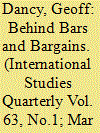

|
|
|
|
|
| Summary/Abstract |
The global transitional justice tool kit—involving the use of criminal prosecutions, amnesties, and other mechanisms to address past human rights abuse—has become a primary means for thwarting future human rights violations and consolidating democracy. Nevertheless, evidence on the consequences of transitional justice remains mixed and amenable to contradictory interpretations. Existing studies fail to adequately address issues of selection, the difference between short- and long-term effects of transitional justice mechanisms, and qualitative and quantitative differences in state practices. This article uses a new database of transitional justice mechanisms to address these concerns and test propositions from realist, constructivist, and holistic approaches to this set of policy issues. We find, among other things, that prosecutions increase physical integrity protections, while amnesties increase the protection of civil and political rights. Our analysis suggests that different transnational justice policies each play a potentially positive, but distinct, role in new democracies and in decreasing violations of human rights.
|
|
|
|
|
|
|
|
|
|
|
|
|
|
|
|
| 2 |
ID:
165432


|
|
|
|
|
| Summary/Abstract |
How do peacekeepers operating in Haiti, Liberia, and the Democratic Republic of the Congo (DRC) discursively construct the local people, especially local women, and to what effect? I show a connection between peacekeepers’ representations of local people, articulated in discourse, and the gendered, often sexualized interactions and transactions in peacekeeping sites. Gender plays a central role in peacekeeper discourse. It situates the peacekeeper outside, and superior to, the chaotic, dysfunctional, feminized local. At the same time, a close reading of peacekeepers’ representations of local people disrupts idealized notions of peacekeeper masculinity as protective and benign, which still persist in peacekeeping circles, revealing it as something more vulnerable and brittle. The connection between discourse and (non)performance of peacekeeping duties is neither causal nor straightforward, but I argue that peacekeepers’ discursive constructions of locals affect how peacekeepers interpret their mandate to protect civilians: protection becomes conditional on peacekeepers’ perceptions of locals’ appearance, affect, behavior, and their ability to act out an idealized role as someone “worth” protecting. The article thus brings new insight to our understandings of gender, masculinities, and protection failures in peacekeeping.
|
|
|
|
|
|
|
|
|
|
|
|
|
|
|
|
| 3 |
ID:
165433
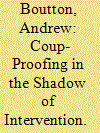

|
|
|
|
|
| Summary/Abstract |
How does the anticipation of external support affect dictators’ domestic political behavior? We lack a convincing explanation for why authoritarian leaders often attempt to consolidate power in ways that heighten the risk of violence and endanger the regime. Adapting the moral hazard framework from the alliance literature, I argue that the anticipation of military support from allies lowers the potential costs of regime purges. This reduces the incentives for dictators to govern inclusively, encouraging more aggressive coup-proofing actions and generating a higher risk of retaliatory violence. Using new data on elite purges in authoritarian regimes, I find that defensive alliances increase the propensity of dictators to aggressively consolidate power. In addition, these types of alliances lead to purges of more powerful elites, which, in turn, increase the likelihood of post-purge large-scale violence. By contrast, forms of external support that entail less commitment by the patron do not have these effects. I provide an overview of the origins of the 1998–1999 civil war in Guinea-Bissau to complement the novel empirical results and to illustrate the causal logic of the argument in the context of West African alliance politics.
|
|
|
|
|
|
|
|
|
|
|
|
|
|
|
|
| 4 |
ID:
165440


|
|
|
|
|
| Summary/Abstract |
Why do intergovernmental organizations (IGOs) that espouse democratic commitments suspend the membership of some states that backslide on those commitments, while leaving that of others intact? We argue that a combination of geopolitical factors and institutional rules help explain this inconsistent pattern. Remaining member states insulate geopolitically important states—particularly those with large endowments of oil resources—from suspension. Institutional factors, such as voting rules and the size of the IGO, create veto points that reduce suspensions. Using an original global data set of IGO suspensions and charter commitments from 1980 to 2010, we find strong support for our argument. We test a key assumption of existing scholarship that claims IGOs serve as credible-commitment devices for political reform and democratization. We show that once a state becomes an IGO member, it can often remain in the IGO even after violating its democratic commitments.
|
|
|
|
|
|
|
|
|
|
|
|
|
|
|
|
| 5 |
ID:
165439
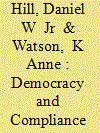

|
|
|
|
|
| Summary/Abstract |
Research on international human rights law suggests that the beneficial effects of treaties depend on the strength of democratic political institutions. However, democracies are, by definition, compliant with many provisions in treaties that protect civil and political rights. Additionally, theories of compliance derive from a focus on civil and political rights rather than on other rights, so we lack a good understanding of whether predictions hold for other kinds of rights. We examine compliance with the Convention for the Elimination of All Forms of Discrimination against Women (CEDAW), which protects rights that are distinct from those that characterize democratic governance. To measure compliance, we create a new indicator of women's rights that offers several advantages over existing indicators. We examine the conditional effect of CEDAW using models that allow for heterogenous treaty effects. This helps to adjudicate between theories that expect treaties to be most effective in highly democratic countries and those that expect them to be most effective among partial democracies. Our findings do not support either expectation and suggest that effectiveness does not depend on democracy, at least in the case of CEDAW. This points to the need to enrich existing theories of ratification and compliance by accounting for differences in the nature of the rights protected by different treaties.
|
|
|
|
|
|
|
|
|
|
|
|
|
|
|
|
| 6 |
ID:
165444


|
|
|
|
|
| Summary/Abstract |
International relations scholarship typically treats foreign policy as a taken-for-granted analytical concept. It assumes either that all historical polities have foreign policies or that foreign policy originates in seventeenth-century Europe with the separation between the “inside” and “outside” of the state. It generally holds that foreign policy differs in essential ways from other kinds of policy, such as carrying with it a special need for secrecy. I argue against this view. The difference between “foreign” and “domestic” policy results from specific political processes; secrecy begat foreign policy. Growing domestic differentiation between state and civil society in the eighteenth century—articulated through a relatively free press operating in a nascent public sphere—enabled the emergence of foreign policy as a practical concept. The concept served to delimit the legitimate sphere of political discourse from the exclusive, executive sphere of king and cabinet. I explore these processes in Britain and France, important cases with different trajectories, one of reform, the other of revolution. Historicizing foreign policy like this serves to denaturalize the separation between different forms of policy, as well as the necessity of secrecy. Doing so cautions against the uncritical application of abstract analytical terms across time and space. jel code: historical international relations foreign policy conceptual analysis
|
|
|
|
|
|
|
|
|
|
|
|
|
|
|
|
| 7 |
ID:
165435


|
|
|
|
|
| Summary/Abstract |
Why do leaders sometimes turn to covert action when overthrowing foreign regimes? Many scholars locate secrecy's appeal in its capacity to help control escalation dynamics or shield vulnerable politicians from domestic audience costs. This article instead identifies international law as the main determinant of covert regime change. I argue that leaders are more likely to pursue secrecy when they lack a legal exemption from the nonintervention principle, such as a credible self-defense claim or authorization from an international body. Brazen violations of nonintervention invite hypocrisy costs and damage a state's credibility. Leaders are more likely to choose overt action when one or more legal exemptions are available. I test my argument against two cases of US-led regime change in the Cold War, one covert and one overt: the Bay of Pigs and the invasion of Grenada, respectively. This article advances debates on political secrecy, international law, and the future of the liberal order.
|
|
|
|
|
|
|
|
|
|
|
|
|
|
|
|
| 8 |
ID:
165441
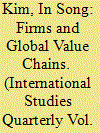

|
|
|
|
|
| Summary/Abstract |
Trade policy has become increasingly multidimensional. Current trade agreements not only address market access but also encompass rules and provisions related to flexibility of commitment, investment protection, and dispute settlement mechanisms. Yet, rigorous evidence about how interest groups evaluate each of these in relation to the others remains scarce. We develop a firm-level theoretical framework to explain how firms’ international operations affect their preferences on different trade policy measures. We experimentally evaluate preferences over multiple policy dimensions using a conjoint analysis on firms in Costa Rica. Notably, for many types of firms, the standard trade policy measures of yesteryear—tariffs and subsidies—are no longer their most important concerns. Instead, the degree of firms’ involvement in global value chains shapes their preferences. Multinational corporations care most about protection of their foreign investments. Those exporters who are not central to global supply networks most value strong dispute settlement procedures. Finally, we find that preferences over these policy dimensions are more likely to vary by firm than by industry, which calls into question the existing literature's focus on interindustry distinctions.
|
|
|
|
|
|
|
|
|
|
|
|
|
|
|
|
| 9 |
ID:
165434
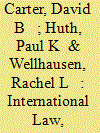

|
|
|
|
|
| Summary/Abstract |
Although contentious interstate disputes are widely known to depress foreign direct investment (FDI), we identify and explain variation in investor responses even to territorial disputes, known to be slow to resolve and prone to militarization. Forward-looking and profit-seeking investors have incentives to increase FDI when the characteristics of a dispute point toward peace. These incentives drive them to increase investment even prior to an actual settlement. Given that legal focal points—when international law identifies one side in the dispute as having a clear legal advantage—promote peace, countries in disputes with legal focal points should receive more FDI. To support this argument, we use new data on international law and territorial disputes from 1980 to 2010 to explain variation in FDI across countries, as well as variation in the timing of within-country FDI accumulation. While a growing body of work demonstrates how international law influences state behavior, we show that it also profoundly influences the investment patterns of firms.
|
|
|
|
|
|
|
|
|
|
|
|
|
|
|
|
| 10 |
ID:
165430


|
|
|
|
|
| Summary/Abstract |
While we know that war can have wide-ranging consequences for life expectancy, social capital, and political participation, we know little about how wartime violence affects intimate relationships. Existing literature suggests that conflict violence could increase the risk of intimate-partner violence, but lacks compelling statistical evidence to evaluate this claim. We test this proposition with newly available data on conflict-related violence and the Demographic and Health Surveys data on intimate-partner violence in Peru. We find that exposure to general conflict violence significantly increases the risk of intimate-partner abuse and that these effects are particularly pronounced for conflict-related sexual violence. This information should help policy makers and practitioners improve the efficacy of domestic violence prevention programs by identifying and targeting populations most at risk.
|
|
|
|
|
|
|
|
|
|
|
|
|
|
|
|
| 11 |
ID:
165445


|
|
|
|
|
| Summary/Abstract |
While international relations scholars make many claims about violence, they rarely define the concept. This article develops a typology of three distinct kinds of violence: direct, indirect, and pacification. Direct violence occurs when a person or agent inflicts harm on another. Indirect violence manifests through the structures of society. We propose a third understanding of violence: pacification. Using a phenomenological methodology, and drawing on anarchist and postcolonial thought, we show that the violence of pacification is diffuse, inconspicuous, intersubjective, and structured into the fabric of society. This understanding of violence matters for the study of international relations in general and research on the liberal peace in particular. We argue that the spread of liberal institutions does not necessarily decrease violence but instead transforms it. Our phenomenological analysis captures empirical trends in human domination and suffering that liberal peace theories cannot account for. It reveals how a decline in direct violence may coincide with the transformation of violence in ways that are concealed, monopolized, and structured into the liberal order. We call this process liberal pacification.
|
|
|
|
|
|
|
|
|
|
|
|
|
|
|
|
| 12 |
ID:
165431


|
|
|
|
|
| Summary/Abstract |
Do international lenders of last resort create financial instability by generating moral hazard? The evidence is thin and plagued with measurement error. We use the number of American troops hosted by third countries to measure the strength of American commitment to ensuring the countries’ economic health. We test several hypotheses against a dataset covering about sixty-eight countries between 1960 and 2009. Using evidence from fixed-effects and instrumental-variable models, we find that increasing the number of US troops by one standard deviation above the mean raises the probability of a financial crisis in the host country by up to 13 percentage points. We also investigate the channels through which moral hazard materializes. Countries with more US troops conduct more expansionary fiscal and monetary policies, implement riskier financial regulations, and receive more capital, especially from US banks. While many scholars of international relations view the American overseas military presence as a source of stability, we identify an underexplored mechanism by which it generates instability.
|
|
|
|
|
|
|
|
|
|
|
|
|
|
|
|
| 13 |
ID:
165436


|
|
|
|
|
| Summary/Abstract |
Newspapers print alarming headlines when foreign governments hire U.S.-based lobbyists to promote their interests in Washington D.C. But does foreign lobbying systematically affect U.S. foreign policy? We provide an analysis of the influence of foreign lobbying on one important component of U.S. foreign policy: the evaluation of human rights practices abroad. U.S. human rights ratings can have a large impact on American foreign policy. They affect foreign aid, sanctions, and trade. Thus, we expect that many countries seek to tilt State Department Country Reports on Human Rights in their favor through information they provide to U.S.-based lobbyists. Our statistical analysis of these State Department reports and lobbying data from the Foreign Agent Registration Act between 1976‒2012 shows that, holding other factors equal, more foreign lobbying leads to more favorable U.S. human rights reports—when compared to both previous reports and Amnesty International reports. Furthermore, our findings contribute to the growing literature on performance indicators like human rights ratings by highlighting the politics of how those ratings are generated.
|
|
|
|
|
|
|
|
|
|
|
|
|
|
|
|
| 14 |
ID:
165438
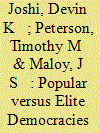

|
|
|
|
|
| Summary/Abstract |
Scholarly research generally finds that democratic governments are more likely to respect human rights than other types of regimes. Different human rights practices among long-standing and affluent democracies therefore present a puzzle. Drawing from democratic theory and comparative institutional studies, we argue more inclusive or “popular” democracies should enforce human rights better than more exclusive or “elite” democracies, even in the face of security threats from armed conflict. Instead of relying on the Freedom House or Polity indexes to distinguish levels of democracy, we adopt a more focused approach to measuring structures of inclusion, the Institutional Democracy Index (IDI), which captures meaningful differences in how electoral and other institutions channel popular influence over policy-making. Analyzing levels of physical integrity rights through a time-series cross-sectional research design of forty-nine established democracies, supplemented by structured case comparisons, reveals a significant and robust relationship between more inclusive democratic institutions and better respect for human rights.
|
|
|
|
|
|
|
|
|
|
|
|
|
|
|
|
| 15 |
ID:
165443
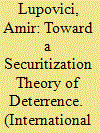

|
|
|
|
|
| Summary/Abstract |
This note incorporates securitization scholarship into the study of deterrence. I argue that deterrence is a securitizing move, and it is embedded in and affected by a broader assemblage of securitizing moves performed by different actors. These include the deterrer, the putative challenger, and various third parties. Linking deterrence theory and securitization theory opens up promising directions for theory and research. Among other things, it provides a way for interpretative scholars to engage with debates within traditional deterrence scholarship—such as those regarding deterrence success, deterrence credibility, and the effects of the use of force on these dynamics. It also highlights often-overlooked issues in the study of deterrence. These include processes through which actors come to adopt this strategy. It also includes processes through which the threat to deterrence itself becomes a powerful political tool for mobilizing support to different strategic moves.
|
|
|
|
|
|
|
|
|
|
|
|
|
|
|
|
| 16 |
ID:
165442


|
|
|
|
|
| Summary/Abstract |
Scholars find a clear link between a state's election to a rotating membership on the United Nations Security Council (UNSC) and increased receipt of foreign aid, especially that provided by the United States. Most researchers view this finding as evidence of Washington's attempts to buy the votes of rotating members of the UNSC. If this is the case then it raises serious concerns about the legitimacy of UNSC decisions. However, while current statistical tests show an association between US foreign aid and holding one of the rotating seats on the UNSC, they do not establish the underlying causal mechanism. We seek to do so by generating theoretically motivated hypotheses about the relationship between relative voting congruence with the United States and the receipt of US foreign aid. Leveraging natural variation from the rotating structure of nonpermanent UNSC members, we uncover a causal relationship consistent with the claim that the United States uses foreign aid to procure support for its positions on the UNSC.
|
|
|
|
|
|
|
|
|
|
|
|
|
|
|
|
|
|
|
|
|